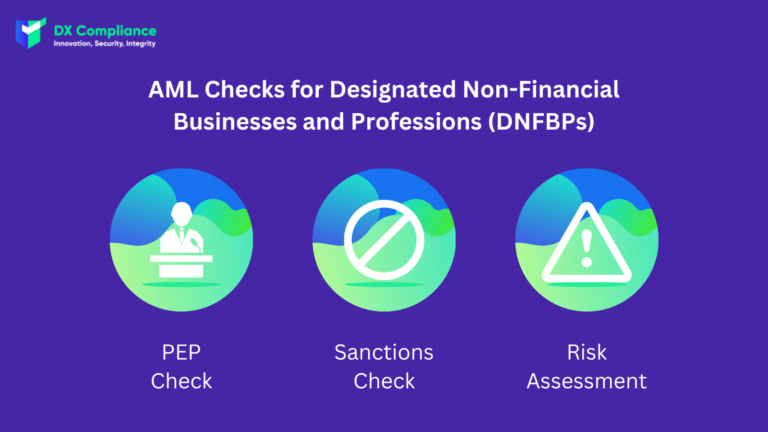16 November 2022, 11:20
Tagline
16 November 2022, 11:20
Tagline
DNFBPs function as non-financial entities in the market, but their nature or transactions are often suspicious of money laundering and terrorist funding.
You can see in the examples list below which business are classified as DNFBPs:
The term DNFBP was introduced in the 1990s as a result to fight against financial criminals who sought to avoid increased AML/CFT scrutiny by using non-financial businesses to launder money.
In many jurisdictions today DNFBPS are regulated. And while many financial regulators have tailored their AML/CFT regulations to counter the unique money laundering threats posed by different types of DNFBP it is important to stay ahead of the game and to fulfill the obligation by implementing effective monitoring systems such as DX Check AML to ensure DNFBP care compliant with AML/CFT requirements.
Designated Non-Financial Business Professions (DNFBP) are attractive to criminals for money laundering, financial crimes, and terrorist financing. This is due to money laundering techniques, such as the use of legal entities to disguise true ownership and control of illicit proceeds. The increasing involvement of professionals and trusted business relationships to advise and assist in money laundering an acute problem for regulators. And because of this high risk, AML/financial crime rules exist for these Designated Non-Financial Business Professions.
If a Designated Non-Financial Businesses and Professions can potentially fall victim to money laundering, implementing the relevant AML regulations is essential. Otherwise, fines will be imposed by the regulatory authorities.
In principle, the regulations for DNFBPs are the same as those for financial institutions. However, industry-specific adjustments are made according to the business activity and the risk associated with the industry.
Below is a summary of the obligations for DNFBPs. It is relevant that if you fall under the category of DNFBPs, inquire about the current regulations specific to you.

Screening requirements of DNFB for Politically Exposed Persons (PEPs) are an important part of the Customer onboarding and the ongoing monitoring during the client relationship. PEP is not in all jurisdictions defined in the same way. But in general, Politically exposed Persons (PEPs) are persons who hold or have held an important public function. This function may, for example, give them influence over the use of taxpayer funds or the awarding of contracts by state-owned enterprises. As such, they are considered by the Financial Action Task Force to be a category of individuals more vulnerable to bribery, corruption, and money laundering than most.
Politically Exposed Persons are divided into 2 different categories: Foreign & Domestic.
Within the sanction screening, you can check for targeted financial sanctions (TFS). Individual countries and multinational organizations (e.g., the EU and the United Nations) impose sanctions to pressure other countries or organizations to change their behavior. Sanctions can be directed against individuals, specific companies, or entire nations.
There are 2 main types of financial sanctions: Asset freezing and the prohibition to offer funds and services.
Generally, you should screen (daily) your customers, potential customers, beneficial owners, and transactions to identify possible matches with high risk and suspicious activities. Furthermore, you should conduct screening on existing, new, and potential clients to verify any positive names matched with any designated person (Entity or Individual). And in addition, upon a new update to the relevant sanctions list screen your customer database without delaywhen new names are listed.
The aim of a client risk assessments is to identify and assess the money laundering (ML) and/or terror financial (TF) risks identified at individual client level.
Therefore, the Risk Based Approach is important to implement in your organization. As a core principle of AML compliance the so called risk-based approach (RBA) refers to adjusting the level and type of compliance work done (frequency, intensity and/or amount), to the risks present.
DNFBP must conduct risk assessments of their business and customers. A risk-based assessment should be a dynamic process and involving regular review, and the use of these reviews to establish the appropriate processes to match the levels of risk. The findings of these assessments should be used to determine the level of Customer Due Diligence (CDD) that should be undertaken.
DX Compliance is an AML and Compliance firm helping our clients identify, prevent and report financial crime. DX Compliance help DNFBPs, Banks, FinTech’s and Payments Providers to continually monitor their risk and detect the threat of money laundering to ensure compliance and reduce fines.
The AML Compliance solution DX CheckAML helps you perform your Risk Assessments and Customer Due Diligence (CDD) as well as to perform the Enhanced due diligence (EDD). This includes checks for targeted financial Sanctions as well as Pep Screenings. In addition to that it also gives you the possibility of an ongoing monitoring in terms of Sanctions Screenings.
CheckAML is the most efficient and cost-effective way of carrying out money laundering checks. We offer the only instant AML solution with full PEP & sanctions screening, ongoing monitoring and customer risk assessment worldwide. This helps to ensure Client Due Diligence for legal practices.
Our data and coverage is global, real-time and reliable, all your checks are automatically saved, for audits and regulatory visits. So everything you need we’ve got you covered.
Start your journey today and use CheckAML to screen your clients against global databases on an ongoing basis. To setup your account it takes less than 5 minutes. To learn more we also recommend to speak to our regional Sales Team and ask for a Demo.
Curious? Try it out now!

08.08.2022
An overview of recent AML developments in the UAE.
Get access
15.10.2021
The introduction of 6AMLD regulations aims to reduce financial crimes.
Get access
27.07.2021 AML Compliance
Uncovering the PEP and Sanctions Lists and Global Regulation
Get access